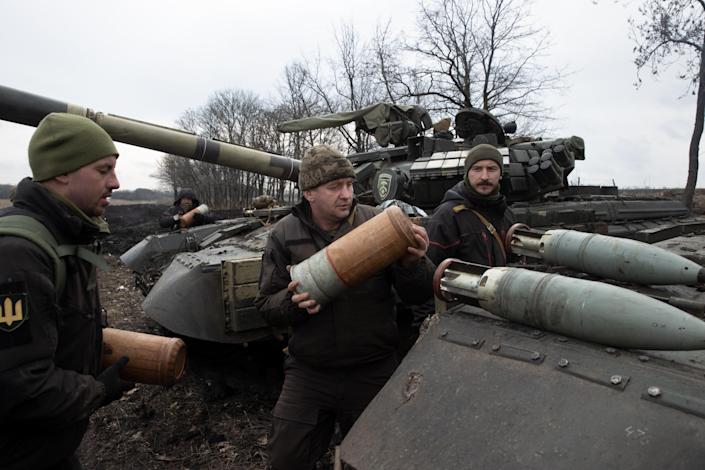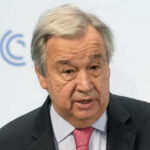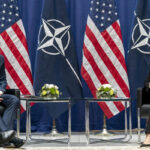
MOSCOW — At this moment of crescendo for the Ukraine crisis, it all comes down to what kind of leader President Vladimir Putin is.
In Moscow, many analysts remain convinced that the Russian president is essentially rational, and that the risks of invading Ukraine would be so great that his huge troop buildup makes sense only as a very convincing bluff. But some also leave the door open to the idea that he has fundamentally changed amid the pandemic, a shift that may have left him more paranoid, more aggrieved and more reckless.
Sign up for The Morning newsletter from the New York Times
The 20-foot-long table Putin has used to socially distance himself this month from European leaders flying in for crisis talks symbolizes, to some longtime observers, his detachment from the rest of the world. For almost two years, Putin has ensconced himself in a virus-free cocoon unlike that of any Western leader, with state television showing him holding most key meetings by teleconference alone in a room and keeping even his own ministers at a distance on the rare occasions that he summons them in person.
Speculation over a leader’s mental state is always fraught, but as Putin’s momentous decision approaches, Moscow commentators puzzling over what he might do next in Ukraine are finding some degree of armchair psychology hard to avoid.
“There’s this impression of irritation, of a lack of interest, of an unwillingness to delve into anything new,” Ekaterina Schulmann, a political scientist and former member of Putin’s human rights council, said of the president’s recent public appearances. “The public is being shown that he has been in practical isolation, with ever fewer breaks, since the spring of 2020.”
A large-scale invasion of Ukraine, many analysts point out, would be an enormous escalation compared with any of the actions Putin has taken before. In 2014, the Kremlin’s subterfuge allowed Russian forces stripped of identifying markings to capture Crimea without firing a single shot. The proxy war Putin fomented in Ukraine’s east allowed him to deny being a party to the conflict.
“Starting a full-scale war is completely not in Putin’s interest,” said Anastasia Likhacheva, the dean of world economy and international affairs at the Higher School of Economics in Moscow. “It is very difficult for me to find any rational explanation for a desire to carry out such a campaign.”
Even if Putin were able to take control of Ukraine, she noted, such a war would accomplish the opposite of what the president says he wants: rolling back the NATO presence in Eastern Europe. In the case of a war, the NATO allies would be “more unified than ever,” Likhacheva said, and they would be likely to deploy powerful new weaponry along Russia’s western frontiers.
At home, Putin has always been keen to project the aura of a sober statesman, overruling the nationalist firebrands on prime-time talk shows and in parliament who have been urging him for years to annex more of Ukraine.
And while he casts himself as Russia’s guarantor of stability, he could face stark economic headwinds from Western sanctions and social upheaval if there are casualties on the battlefield and among civilians. Millions of Russians have relatives in Ukraine.
For the moment, Russians largely appear to subscribe to the Kremlin narrative that the West is the aggressor in the Ukraine crisis, said Denis Volkov, director of the Levada Center, an independent pollster in Moscow. The alarmist messaging out of Washington about an imminent Russian invasion has only bolstered that view, he said, because it makes the West seem to be the one that is “exerting pressure and escalating tensions.”
If Putin were to carry out a short and limited military operation along the lines of the five-day war against Georgia in 2008, he said, Russians could be expected to support it.
But “if this is a lengthy, bloody war, we get to a situation where it’s impossible to forecast,” Volkov said. “Stability ends.”
Given that such a war still seems unthinkable and irrational to so many in Moscow, Russian foreign policy experts generally see the standoff over Ukraine as the latest stage in Putin’s yearslong effort to compel the West to accept what he sees as fundamental Russian security concerns. In the 1990s, that thinking goes, the West forced a new European order upon a weak Russia that disregarded its historical need for a geopolitical buffer zone to its west. And now that Russia is stronger, these experts say, it would be reasonable for any Kremlin leader to try to redraw that map.
Fyodor Lukyanov, a prominent Moscow foreign policy analyst who advises the Kremlin, said Putin’s goal now was “to force the outcome of the Cold War to be partially revised.” But he still believes Putin will stop short of full-scale invasion, instead using “special, asymmetric or hybrid means” — including making the West believe that he is truly prepared to attack.
“A bluff has to be very convincing,” Lukyanov said. And the United States, he went on, with its robust portrayals of an aggressive Russia poised for invasion, “is playing along at 200%.”
By this line of thinking, Russian analysts say, U.S. officials are falling for an exaggerated image of Putin as an evil genius. Since Putin’s past attempts to negotiate with the West over arms control and NATO expansion failed, they say, the Kremlin chose to raise the stakes to a point at which its interests became impossible to ignore.
“He is very successful at using the negative image that has been created of him as a demon,” said Dmitri Trenin, head of the Carnegie Moscow Center think tank, describing Putin as capitalizing on fears that he was prepared to unleash a horrific war. “The plan was to create a threat, to create the sense that a war could happen.”
But the experts have been wrong before. In 2014, Putin seized Crimea, even as few Moscow analysts were predicting a military intervention. And skeptics of the view that Putin is bluffing point out that during the pandemic, he has already taken actions that earlier seemed unlikely. His harsh crackdown against the network of Alexei Navalny, for example, has contradicted what had been a widely held view that Putin was happy to allow some domestic dissent as an escape valve to manage discontent.
“Putin, in the last year, has crossed a lot of Rubicons,” Michael Kofman, director of Russia studies at CNA, a research institute based in Arlington, Virginia, said last week. “Folks who believe that something this dramatic is unlikely or improbable may not have observed that qualitative shift in the last two years.”
© 2022 The New York Times Company




